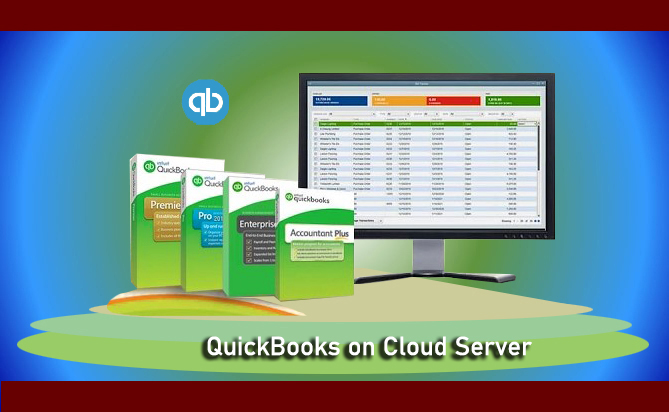QuickBooks on Cloud Server: Revolutionizing Financial Management for Businesses
In today’s fast-paced business environment, efficiency and accessibility are key to maintaining a competitive edge. As organizations increasingly rely on digital solutions, the demand for cloud-based applications has skyrocketed. Among these, QuickBooks on a cloud server stands out as a game-changer for financial management. This article explores the benefits, features, and implementation process of using QuickBooks on a cloud server, demonstrating how it can revolutionize your business operations.
What is QuickBooks on a Cloud Server?
QuickBooks is an accounting software package developed by Intuit, designed primarily for small and medium-sized businesses. It offers various versions tailored to different business needs, including desktop and online options. When QuickBooks is hosted on a cloud server, it means the software and data are stored on a remote server and accessed over the internet. This setup combines the robust features of QuickBooks with the flexibility and convenience of cloud computing.
Benefits of Hosting QuickBooks on a Cloud Server
- Accessibility: One of the most significant advantages of cloud hosting is the ability to access QuickBooks from anywhere, at any time. Whether you’re at the office, home, or on the go, you can manage your financial data from any device with an internet connection. This is especially beneficial for businesses with remote teams or multiple locations.
- Scalability: Cloud servers offer scalable solutions that grow with your business. As your company expands, you can easily upgrade your storage and processing power without the need for significant upfront investments in hardware.
- Cost-Effectiveness: Hosting QuickBooks on a cloud server can reduce IT costs. There’s no need for expensive servers or extensive maintenance. Cloud providers typically offer flexible pricing models, allowing you to pay for only the resources you use.
- Enhanced Security: Reputable cloud hosting providers implement advanced security measures to protect your data. These include encryption, firewalls, and regular backups. In many cases, cloud security surpasses what small businesses can afford to implement on their own.
- Automatic Updates: With cloud hosting, you always have access to the latest version of QuickBooks. Updates and patches are applied automatically, ensuring you benefit from the newest features and security enhancements without any effort on your part.
- Collaboration: Cloud-based QuickBooks allows multiple users to work on the same file simultaneously. This improves collaboration and streamlines workflows, making it easier for teams to manage finances collectively.
Features of QuickBooks on a Cloud Server
- Real-Time Data Access: With QuickBooks on a cloud server, data is updated in real-time. This means you always have the most current information at your fingertips, facilitating better decision-making and financial planning.
- Customizable User Permissions: Cloud-hosted QuickBooks enables you to set up specific user roles and permissions. This ensures that employees only have access to the data and functions relevant to their roles, enhancing security and operational efficiency.
- Integration Capabilities: QuickBooks integrates seamlessly with a wide range of third-party applications, such as CRM systems, payment gateways, and payroll services. This integration capability extends to the cloud environment, providing a cohesive ecosystem for all your business processes.
- Disaster Recovery: Cloud servers offer robust disaster recovery solutions. In the event of hardware failure, natural disasters, or other unforeseen incidents, your data remains safe and can be quickly restored, minimizing downtime and disruption.
- Mobile Compatibility: QuickBooks on a cloud server is optimized for mobile devices. You can perform essential tasks like invoicing, expense tracking, and financial reporting directly from your smartphone or tablet, enhancing flexibility and productivity.
Implementing QuickBooks on a Cloud Server
- Choose a Reputable Cloud Hosting Provider: The first step in moving QuickBooks to the cloud is selecting a reliable hosting provider. Look for providers with a proven track record, robust security measures, and excellent customer support. Some popular choices include Amazon Web Services (AWS), Microsoft Azure, and specialized QuickBooks hosting providers like Right Networks and Ace Cloud Hosting.
- Evaluate Your Business Needs: Assess your company’s requirements, including the number of users, storage capacity, and specific features you need. This will help you choose the right hosting plan and avoid paying for unnecessary resources.
- Migrate Your Data: Once you’ve selected a provider, the next step is data migration. This process involves transferring your QuickBooks files and data to the cloud server. Most hosting providers offer migration services or detailed guides to assist you. Ensure you back up your data before starting the migration to prevent any loss.
- Configure User Access: Set up user accounts and permissions based on your business structure. Ensure that only authorized personnel have access to sensitive financial data. Most cloud hosting solutions offer easy-to-use interfaces for managing user roles and permissions.
- Train Your Team: Provide training to your employees on how to use QuickBooks in the cloud environment. Familiarize them with any new features or changes in workflows to ensure a smooth transition. Many hosting providers offer training resources and support to help your team get up to speed.
- Monitor and Optimize: After implementation, continuously monitor your cloud environment to ensure optimal performance. Take advantage of analytics and reporting tools provided by your hosting provider to gain insights into usage patterns and identify areas for improvement.
Conclusion
QuickBooks on a cloud server offers a powerful, flexible, and cost-effective solution for managing your business finances. By combining the robust features of QuickBooks with the benefits of cloud computing, you can enhance accessibility, security, and collaboration while reducing IT costs and complexity. Whether you’re a small business looking to streamline operations or a growing enterprise in need of scalable solutions, cloud-hosted QuickBooks can help you stay ahead in today’s competitive landscape. Embrace the future of financial management and take your business to new heights with QuickBooks on a cloud server.
